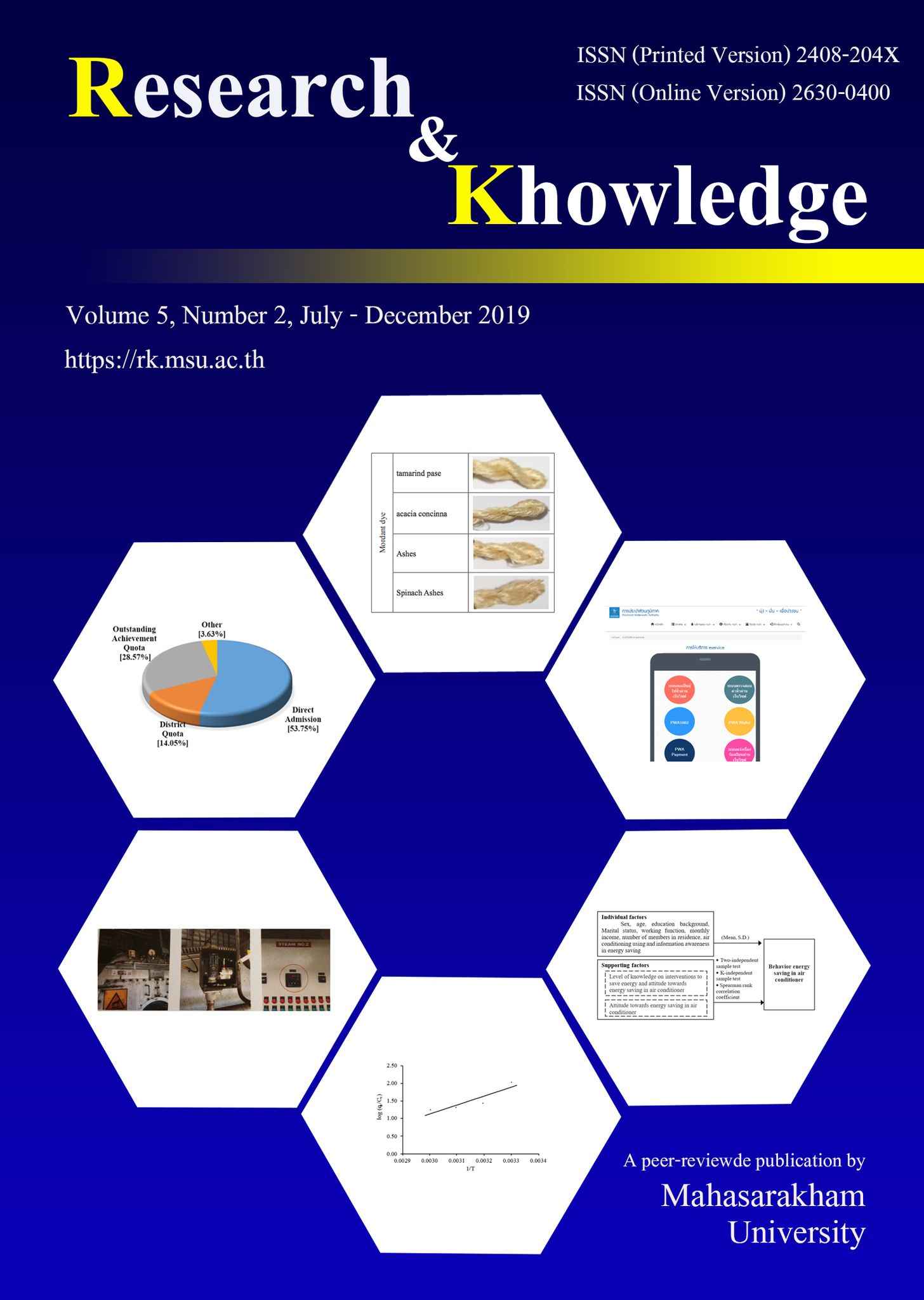A Survey Study on Freetime Behaviour of Undergraduate Students in Mechanical Engineering Program
Keywords:
Freetime Behaviours, Achievement of StudentsAbstract
This research purposed to study on freetime behaviours of undergraduate students in Mechanical Engineering program at Silpakorn University during their freetime and the correlation between their behaviours and their learning achievements via using the mixed methods research. The sample were 347 students in semester year 2/2016. The research instruments included questionnaire and structured interview. The data were statistically analyzed by using frequency, percentage, mean, S.D. and One-way ANOVA. The research findings were as follows: The students spent the average of 75.54 hours per week or 35.26 hours per week (46.68%) on resting, 21.42 hours per week (28.36%) on their study, 16.79 hours per week (22.23%) on others, and 2.07 hours per week (2.74%) on doing exercises, respectively. The correlation between behaviours and learning achievements of students studying the Bachelor of Engineering Program in Mechanical Engineering at Silpakorn University shows that spending time on studying, resting, doing exercises, and other activities, and the learning achievements of the three groups were different and statistically significant at the 0.05 level.
References
Allyn and Bacon. (1998). Research in education/ John W. Best, James V. Kahn, United States of America, A Viacom Company. Aslan, N. (2009). An Examination of Family Leisure and Family Satisfaction among Traditional Turkish Families, Journal of Leisure Research, vol. 41(2), pp. 157-176.
Aslan, N. and Aslan, K. (2012). What is Leisure for Turkish Parents?, Procedia-Social and Behavioral Sciences, vol. 55, October 2012, pp. 390-398.
Bammel, G. and Bammel, L. (1996). Other Factors that Affect Leisure Behavior: Leisure and Human Behavior, Brown and Benchmark Publishers, lowa.
Bergero, M.B. (2008). The Sociology of Leisure: Some Suggestions, Industrial Relations: A Journal of Economy and Society, vol. 1(2), May 2008, pp. 31-45.
Chalermputipong, S. (2011). Leisure Education to Promote Quality of Life, Journal of Faculty of Physical Education, vol. 14(2), July- December 2011, pp. 10-21.
Cho, M., Know, WD. and Jeon, YB. (2010). Are Korean secondary school girls physically active during leisure time?, Health Care for Women International, vol. 31(3), pp. 244-257.
Electronic Transactions Development Agency. (2016). Survey of free time of population in 2015, National Statistical Office, Bangkok.
Kraus, R. (2000). Leisure in a changing American: Trends and Issues, Alyn and Becon, MA.
Mundy, J. (1998). Leisure Education: Theory and Practice, IL, Sagamore Publishing.
Office of the Council of State. (2018). National Education Act 1999, URL: http://web.krisdika.go.th/data/ law/law2/%A198/%A198-20-9999-update.pdf access on 10/06/2019
Pearson Education Inc. (2006). Research in education Tenthedition John W. Best, James V. Kahn, United States of America.
Pesavento, L. and et al. (2008). GoGirlGo! Chicago: , Economic and Community Capital through Physical Leisure Activity for U.S. Girls in Proceedings of the 10th World Leisure Congress 6-10 October 2008, Quebec, Canada.
Russell, R.V. (2005). Pastimes: The context of contemporary leisure, Champaign, Sagamore.
Sirirattanajitt, A. (2015). The Relationship between Leisure Behaviors and Learning Styles of First-Year Undergraduate Students in Hatyai University, Journal of Library and Information Science Srinakharinwirot University, vol. 8(1), January-June 2015, pp. 26-37.
Sivan, A. and Ruskin, H. (2000). Leisure Education, Community Development and Populations with Special Needs, Oxon, CABI Publishing.
Stebbins, R.A. (2012). The Idea of Leisure: First Principles, New Brunswick, Transaction.
Stumbo, N.J. and Peterson, C.A. (2004). Therapeutic Recreation Program Design: Principles and Procedures, San Francisco, Pearson.
Thongboonta, T. (2012). Leisure Time Behavior of the Students in Dhurakij Pundit University, Bangkok, Dhurakij Pundit University.
Downloads
Published
How to Cite
Issue
Section
License

This work is licensed under a Creative Commons Attribution-NoDerivatives 4.0 International License.









